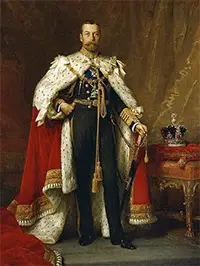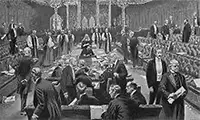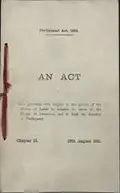The Parliament Act 1911
The Parliament Act 1911 delineated once and for all that the United Kingdom's House of Commons was dominant over the House of Lords. 
King Edward VII had died in 1910, and George V took the throne. One of the new king's first big challenges was the constitutional crisis that had arisen from the "People's Budget" of 1909. The House of Commons had approved the budget, but the House of Lords had rejected it. It was, in effect, a budget for the whole of government and, as such, represented funding proposals for many different programs. The convention in the United Kingdom for many, many years had been that the House of Lords did not vote down any bills relating to expenditure. If a majority in the House of Lords felt strongly about how a Commons-passed bill was proposing to spend money, then the Lords majority could alter key points of the bill, in effect cutting proposed expenditures. This had happened many times, and this is what leaders in the House of Commons would have been expecting to happen in this case. However, it was an extraordinary case. The United Kingdom had had two major political parties for many years. The names had changed, as had the membership, but one of those political parties always seemed to be more conservative in nature and outlook, representing the interests of the wealthy and the upper class element of U.K. society, and the other political party always seemed to be less conservative, perhaps even liberal-minded, in terms of which economic and social classes of society to champion. In the case of the "People's Budget," the majority in the House of Commons were members of the Liberal Party and the majority in the House of Lords were members of the Conservative Party. The two parties commonly disagreed, sometimes fundamentally so, on how to spend the U.K.'s money, and this was one of those times. As it happened, the "People's Budget" called for a suite of taxes on the rich in order to finance a spate of social welfare programs. This was yet another in a series of reform bills that the Commons had passed in relatively recent years. In many cases, the House of Lords had altered the specifics of such bills while still approving them in principle. This time, however, what the Commons majority were proposing went too far, in the minds of the vast majority of the members of the House of Lords. Another element of the conflict was in the nature of the membership of the two houses. Members of the House of Commons were elected; members of the House of Lords were not. As the Reform Acts of 1832, 1867, and 1884 had added millions more men to the voter rolls, the nature and priorities of the average voter had changed. The 19th Century had seen any number of demonstrations for an expansion of rights for people other than wealthy white men. The U.K. had no written constitution but did have hundreds of years of legal precedent on which to draw. In relatively recent times, the monarch had stepped in to help navigate the sometimes troubled waters of a disagreement between Commons and Lords. One handy mechanism at the disposal of the monarch was to create new seats in the House of Lords and then appoint people to fill those seats. Naturally, the monarch would put people in those seats who were going to vote the way the monarch wanted them to, and so even the threat of going to such lengths had been enough to convince the Lords in past years to approve a Commons-passed bill–with needed amendments, of course. In 1713, Queen Anne had created 12 new members of the House of Lords, and that had been enough to approve the Treaty of Utrecht, one of the treaties that helped end the War of the Spanish Succession. As well, opposition from the House of Lords to the Reform Act 1832 had come to an end with King William IV vowed to create 80 new peers in order to ensure the passage of the act. 
With the "People's Budget," however, the disparity between approval and rejection of the bill in the House of Lords was quite high: 350 had voted No, and 75 had voted Yes. After that happened, the Prime Minister, H.H. Asquith, appealed to King Edward VII to create enough Liberal-leaning peers to be able to prevail on a subsequent vote on the bill (or on the vote of a new, very similar bill). Edward did not want to take such a drastic action. He then died and was succeeded by his son, George. Edward had refused by saying that such an issue should be decided by the people directly, by way of a general election. The Liberal leadership agreed, an election took place, and the Liberal Party did indeed have more seats in the House of Commons than any other party; however, the Liberals' majority was achieved only with the help of two other parties, the Irish Parliamentary Party and the Labour Party. In any case, the Liberal Party declared that it had the mandate of the people and that the king was willing to appoint enough new peers to ensure passage of the "People's Budget" in the House of Lords. The Commons passed another version of the budget bill, and the Lords approved it. 
All of the legal wrangling convinced the leaders of the House of the Commons and, importantly, the king that things needed to change. The Parliament Act 1911 was the result. The full title of the act was this: "An Act to make provision with respect to the powers of the House of Lords in relation to those of the House of Commons, and to limit the duration of Parliament." In essence, the full title encapsulated what the act did. The House of Lords could no longer veto, or outright reject, a money bill passed by the House of Commons. They could still offer amendments, as they had done many times before; they could vote to delay the implementation of a money bill, and that delay was limited to one month. The veto protection extended outside money bills as well, to any bill passed by the House of Commons. The Lords could vote to delay implementation of any non-money bill for a maximum of two years. As well, the Parliament Act 1911 reduced the maximum term of Parliament from seven years to five, ensuring that a general election would occur at least every five years. (The seven-year term itself was a convention, a result of the Septennial Act 1716.) The House of Lords, seeing the writing on the wall, did not stand in the way of this act. As a result, the House of Commons became the dominant of the two houses of Parliament. |
|
Social Studies for Kids
copyright 2002–2024
David White




